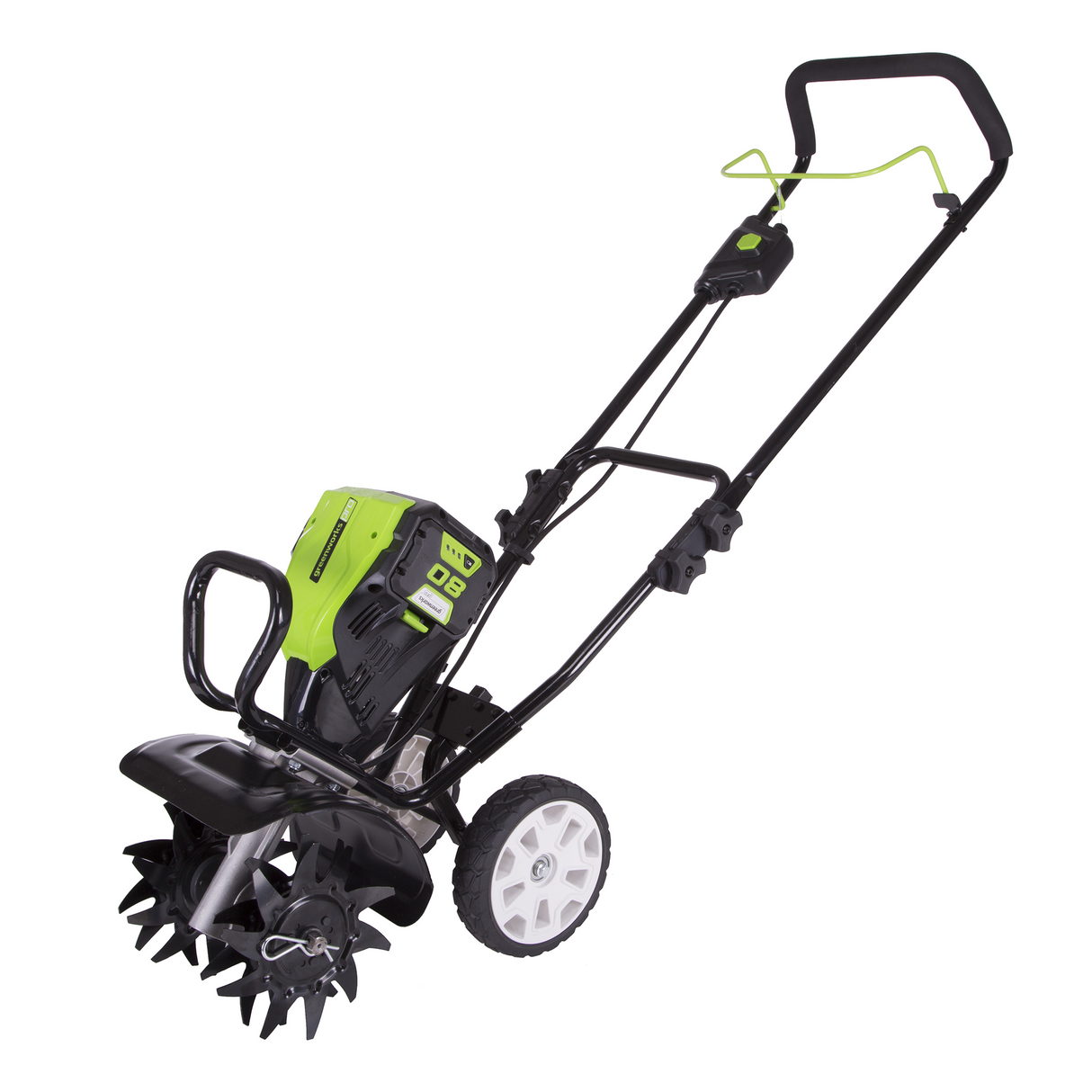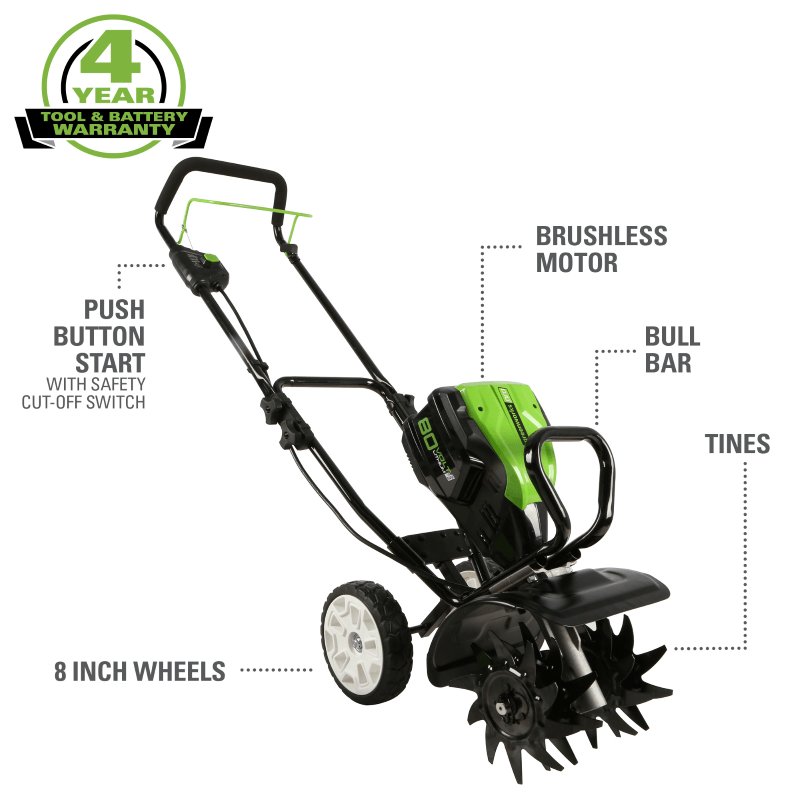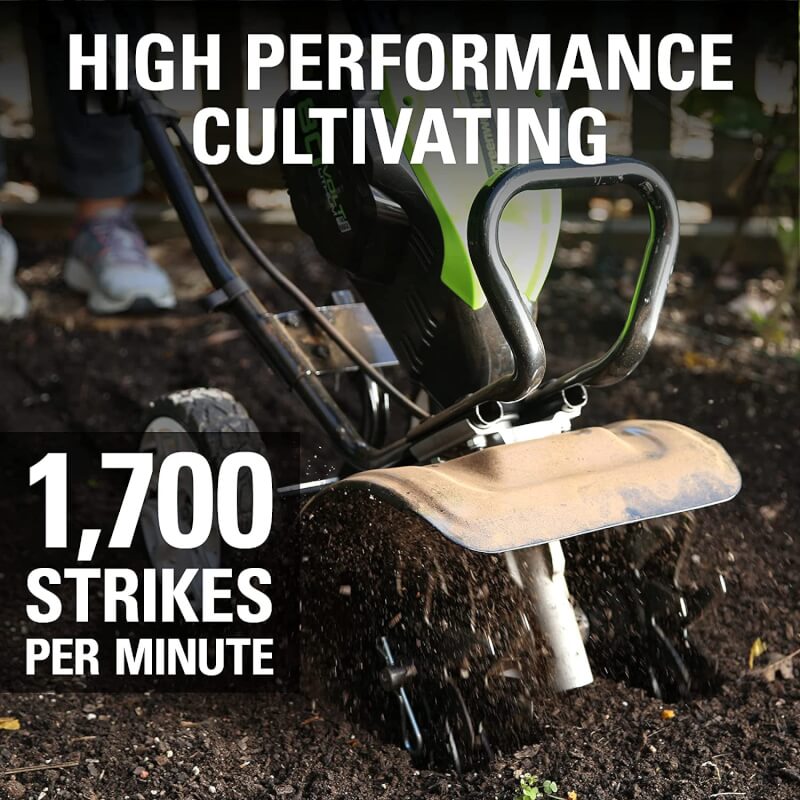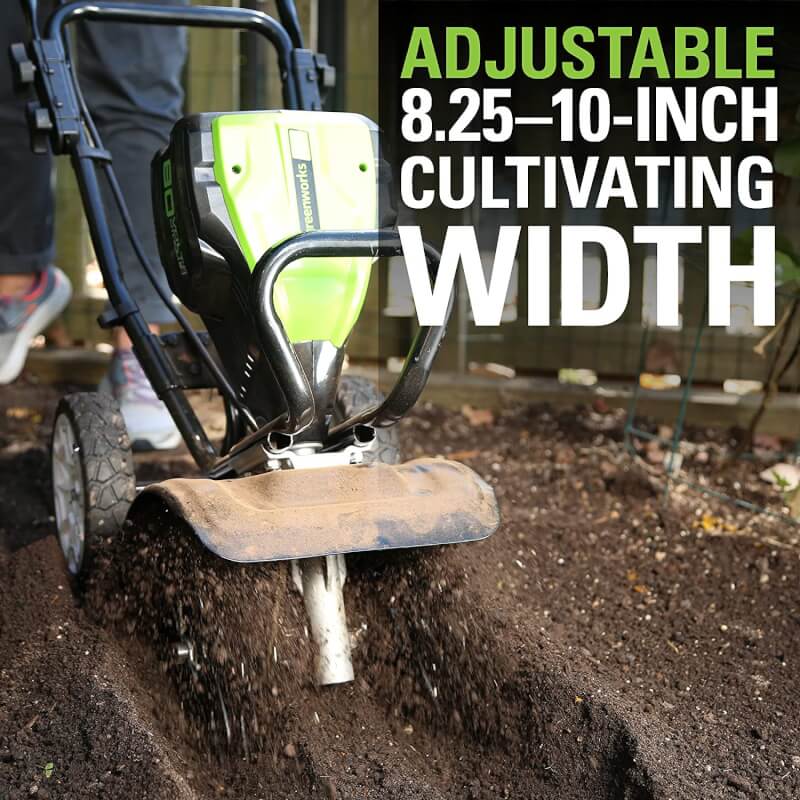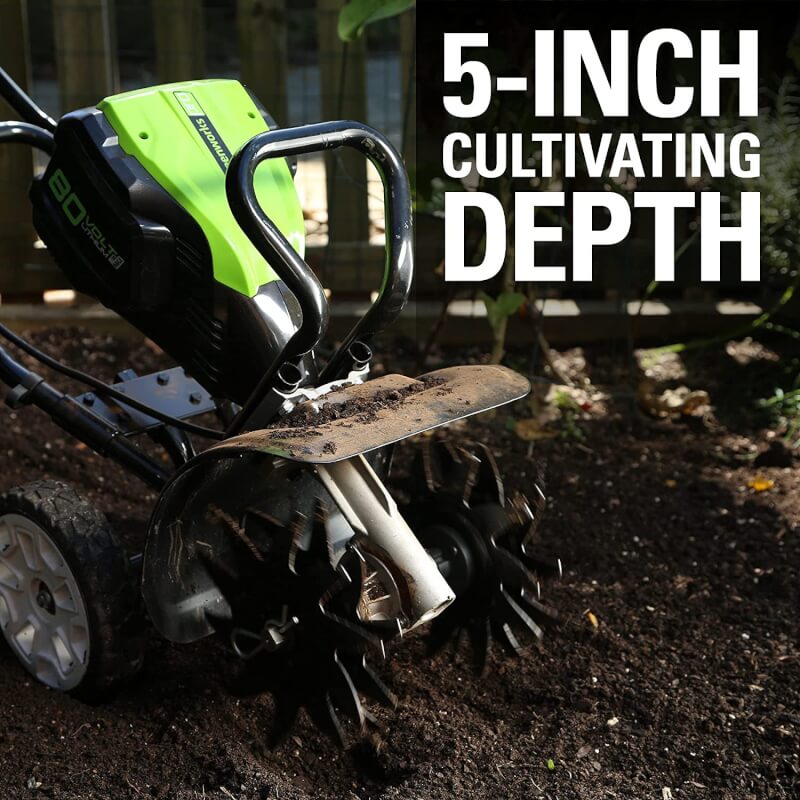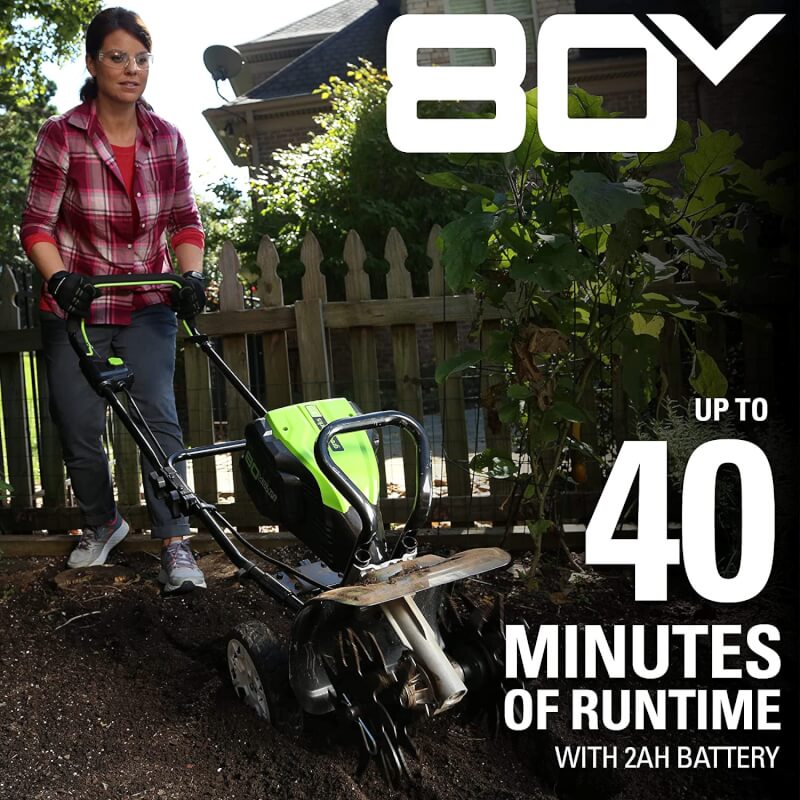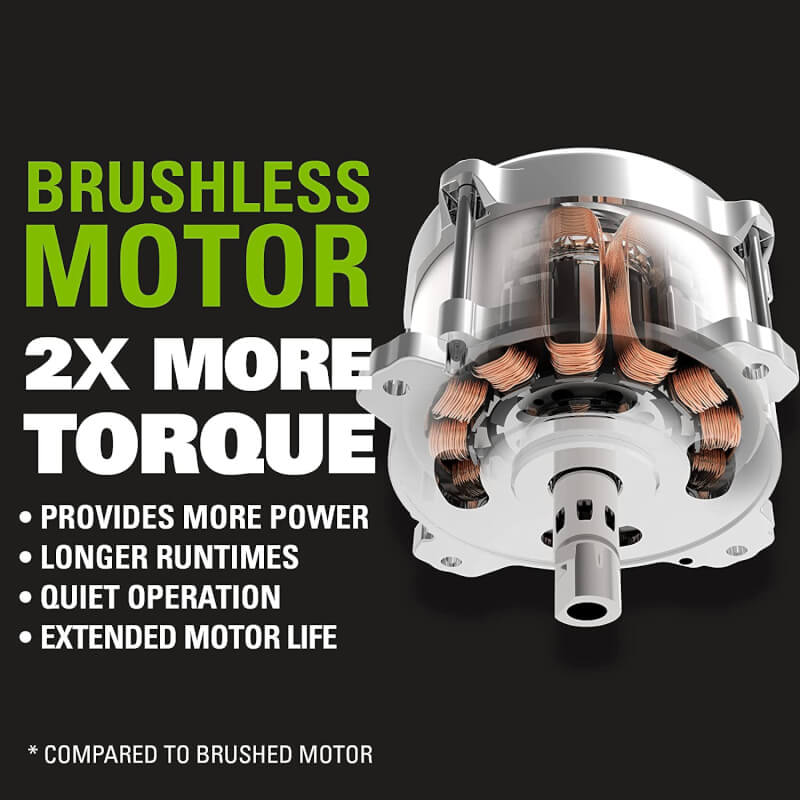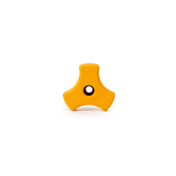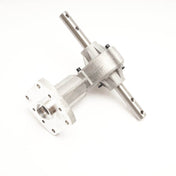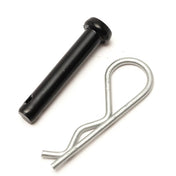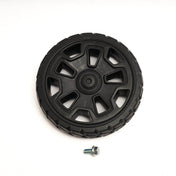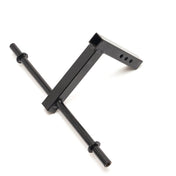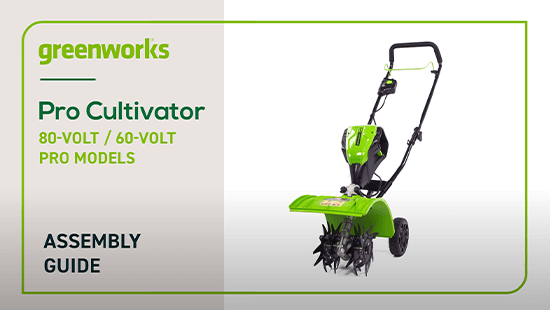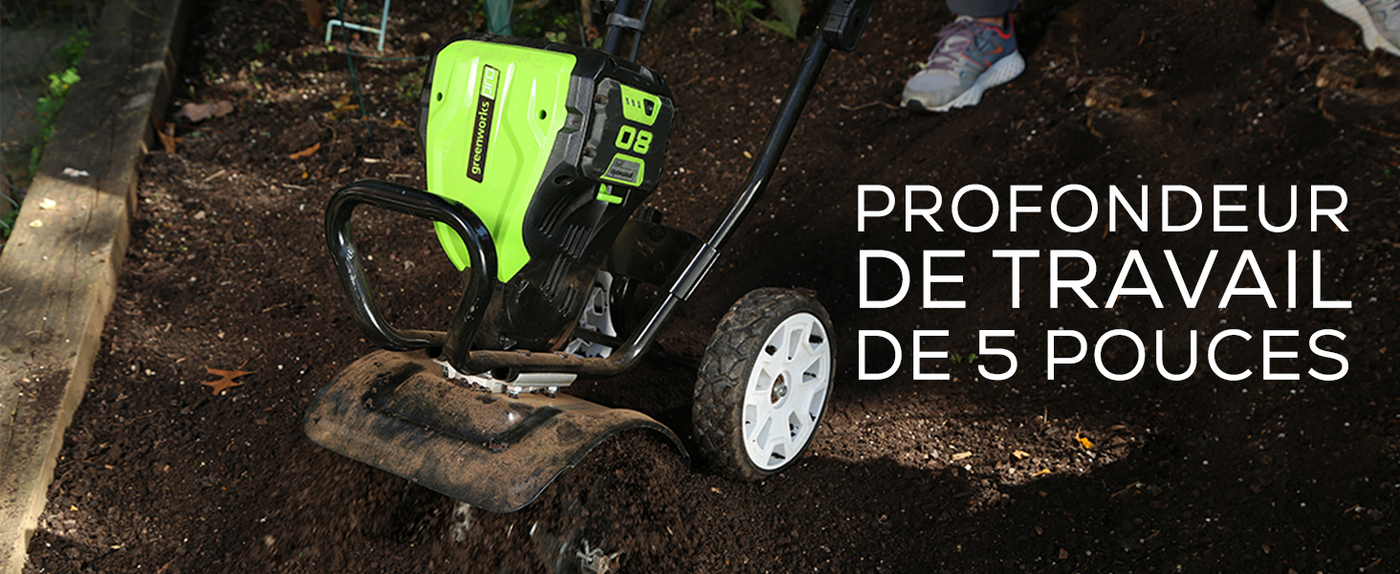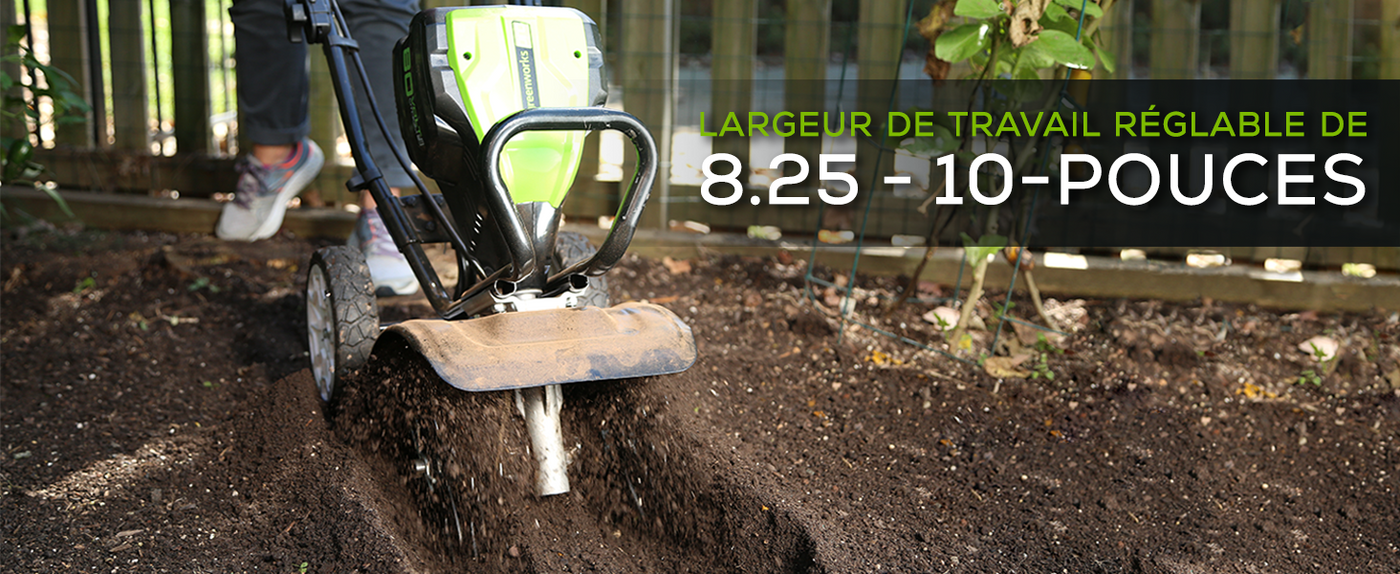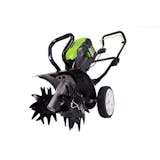Cultivateur 80 V, 10 pouces, batterie 2,0 Ah et chargeur inclus
Garantie
Garantie

Compatible With :
Description
Description
Le cultivateur 80 V, 10 pouces est doté d'un moteur sans balais pour plus de couple, un fonctionnement silencieux et une durée de vie plus longue. Conçu avec quatre dents en acier rotatives vers l'avant, amovibles et réglables avec une largeur de labourage de 10 pouces et une profondeur de labourage de 5 pouces. Il démarre également à la poussée d'un bouton. Passez moins de temps à travailler sur votre pelouse ou votre jardin et plus de temps à profiter des résultats avec le motoculteur Greenworks 80 V 10 po. Il n'a pas de cordon d'alimentation et ne consomme pas de gaz, vous pouvez donc vous concentrer sur la tâche à accomplir. coin de votre propriété.
Spécifications
Spécifications
-
Voltage80 V
-
Ampères-heures2,0 Ah
-
Poids29,3 livres
-
Taille14 po. × 46 po. × 46,5 po.
-
Largeur de labourage10 po.
-
Profondeur de labourage5 po.
-
Temps de charge à 100 %À partir de 30 minutes
-
DuréeJusqu'à 40 minutes
-
MoteurSans balais
-
Poids avec batterie de 2,0 Ah32,9 lb (14,9 kg)
-
Vitesse à vide170 tr/min ± 5 %
-
Garantie4 ans de garantie
-
Spécifications de la batterie lithium-ion 80 V 2,0 Ah - GBA80200
-
Voltage80 V
-
Ampères-heures2,0 Ah
-
Poids3,48 livres
-
Taille3,5 po. × 5,7 po. × 7,7 po.
-
Wattheures144
-
Temps de charge à 100 %À partir de 30 minutes
-
Voyants de capacité de la batterieOui
-
Garantie4 ans de garantie
-
Spécifications du chargeur rapide 80 V à port unique 4 A – GCH8040
-
Voltage80 V
-
Poids3 livres
-
Taille7,7 po. × 9,3 po. × 5,1 po.
-
Temps de charge à 100 %À partir de 30 minutes
-
Sortie maximale4 Ah
-
Option de montage muralOui
-
Indicateur DEL de diagnosticOui
-
Garantie4 ans de garantie
Manuels
Manuels
-
Télécharger :
Vidéos de produits
Foire aux questions
Foire aux questions
- Ce cultivateur peut-il couper de petites racines en forme de mailles sous un arbre ? On m'a dit que les cultivateurs légers comme celui-ci ne rebondissent que sur un sol accidenté.
- À quelle profondeur s'enfoncera-t-il dans la couche arable ?
- Les dents tournent-elles vers l’arrière ?
- Puis-je utiliser mon cultivateur pour éliminer les mauvaises herbes ?
- Quelle est la saison idéale pour utiliser mon cultivateur ?
- Le cultivateur peut-il briser de petites brindilles et branches ?
- Peut-il couper la racine d’un arbre ?
- Puis-je utiliser mon motoculteur comme coupe-bordure ? Puis-je retirer les dents et l'utiliser comme coupe-bordure ?
- Peut-on le laisser dehors sous la pluie ?
- Les dents sont-elles tordues ?
- Comment lubrifiez-vous la boîte de vitesses et quel type de lubrifiant utilisez-vous ?
- Puis-je laisser ma batterie dans le chargeur après l'avoir chargée ?
- Pourquoi les batteries coûtent-elles beaucoup plus cher que l’outil ?
- Comment dois-je entreposer la batterie ? Puis-je laisser la batterie dans le garage ou dans la cabane ?
- Ma batterie est coincée dans mon outil. Comment la retirer ?
- Comment vérifier la charge de ma batterie ?
- Puis-je utiliser n’importe quelle batterie Greenworks dans n’importe quel outil Greenworks ?
- Existe-t-il certains outils qui ne peuvent pas accepter toutes les batteries de même voltage ?
- Est-ce que toutes les batteries de même voltage utilisent le même chargeur ?
- La température de la batterie est-elle importante ?
- Le chargeur indique que ma batterie est complètement chargée, mais je viens de l'utiliser et elle est épuisée. Pourquoi ne se charge-t-elle pas ?
- Mon chargeur clignote en rouge lorsque j'active ma batterie. Pourquoi cela se produit-il ?
- Mon chargeur a un voyant rouge fixe allumé lorsque j'active ma batterie. Que se passe-t-il ?
- Vos chargeurs sont-ils conçus pour des prises 220 V ou 120 V ?
Il pourra arracher de petites racines, mais cet appareil n'est pas conçu pour les racines d'arbres. Nous vous conseillons d'éviter les racines et les rochers lorsque vous utilisez ce cultivateur. Il est idéal pour labourer le sol.
Selon les conditions du sol, le cultivateur descendra jusqu'à une profondeur de 5 pouces. Nous conseillons d'enlever les pierres et les racines avant de cultiver pour éviter d'endommager l'appareil.
Les dents ne tournent pas vers l’arrière.
Il n'est généralement pas recommandé d'utiliser un cultivateur pour éliminer les mauvaises herbes. Bien que cela rende le travail beaucoup plus rapide, cela peut également disperser les graines sous terre, assurant ainsi un retour rapide des mauvaises herbes dans votre jardin.
L'automne et le printemps sont les saisons les plus propices pour sortir votre cultivateur de la cabane. Évitez de l'utiliser si le terrain est trop détrempé car cela pourrait entraîner des mottes compactes lorsque le sol s'assèche. Pour de meilleurs résultats, attendez un jour ou deux après la pluie jusqu'à ce que le sol soit semi-sec.
Il est peut-être capable de gérer de petites brindilles de moins de 1 pouce de diamètre, mais il est conçu pour cultiver le sol pour de petits projets de jardinage comme des parterres de fleurs.
Il ne coupera pas les racines des arbres. Les racines des arbres doivent être évitées lors de l'utilisation de cet appareil car elles pourraient causer des dommages.
Même en réduisant le nombre de dents, cette tondeuse n'est pas idéale pour les bordures, car les dents sont conçues spécifiquement pour creuser le sol pour le labourage plutôt que pour simplement couper les brins d'herbe. Vous pouvez retirer les dents pour les petites surfaces pour le labourage, mais cela ne la rendrait pas adaptée à la coupe des bordures.
S'agissant d'un appareil électrique, il ne doit pas être laissé sous la pluie. Il est conseillé d'entreposer cet appareil en position verticale dans un endroit propre et sec.
Oui, les dents sont courbées pour aider à cultiver davantage le sol pendant l'utilisation.
La boîte de vitesses est remplie de graisse de transmission synthétique et ne devrait jamais avoir besoin d'être remplacée. Cependant, si vous souhaitez changer la graisse, vous devrez retirer la boîte de vitesses de l'unité (4 boulons au point de connexion). Cela laissera la transmission exposée et le lubrifiant pourra être ajouté à la main.
Les chargeurs de batterie sont dotés d'un dispositif d'arrêt automatique pour éviter toute surcharge. Cependant, nous conseillons aux clients de retirer la batterie du chargeur une fois qu'elle est complètement chargée et de débrancher également le chargeur de la prise, car il s'agit d'une bonne pratique de sécurité électrique. Cela permettra également d'éviter les fausses lectures de défauts et permettra au chargeur de se réinitialiser à chaque fois qu'il est utilisé pour charger une batterie.
La batterie est le composant le plus important d'un appareil à batterie. Soyez assuré que nous fixons le prix de nos batteries en tenant compte du coût des matériaux, de la fabrication et des prix actuels du marché. Les batteries sont les éléments les plus coûteux à fabriquer et à expédier dans n'importe quel ensemble. Les ensembles complets comprenant un outil, une batterie et un chargeur sont proposés à un prix abordable afin que les consommateurs puissent commencer à construire cette gamme d'outils et passer à l'achat d'appareils contenant uniquement des outils. Lorsque vous achetez des batteries seules, le coût qu'elles entraînent est plus important.
Lorsque la batterie n'est pas utilisée, nous vous suggérons de la entreposer à l'intérieur, dans un endroit frais et sec, à l'abri de la lumière directe du soleil. Laissez le chargeur débranché et la batterie déconnectée du chargeur, sauf si elle doit être rechargée. Il est recommandé d'entreposer la batterie complètement chargée et, si elle est entreposée pendant une période où aucune utilisation n'est prévue, de vérifier la charge tous les deux mois. Si vous remarquez que la charge a baissé, nous vous conseillons de recharger complètement la batterie avant de la remettre dans son lieu d'entreposage sûr. En suivant ces étapes, vous vous assurerez de tirer le meilleur parti de la durée de vie de la batterie.
Produits 60 V / 80 V : Pour retirer la batterie, appuyez sur le bouton de déverrouillage de la batterie et maintenez-le enfoncé. Ensuite, retirez la batterie en tirant dessus. Dans certains cas, si les ressorts situés en dessous se sont bloqués, vous devrez peut-être appuyer légèrement sur le haut de la batterie pour les réengager et aider la batterie à sortir. La batterie s'insère parfaitement dans le produit pour éviter tout délogement accidentel pendant l'utilisation ; il peut être nécessaire de tirer fort pour la retirer. Avant utilisation, assurez-vous que les rails de la batterie et du produit sont exempts de débris qui pourraient coincer la batterie. Produits 24 V/40 V : Pour retirer la batterie, appuyez sur le bouton de verrouillage de la batterie et maintenez-le enfoncé. Retirez la batterie de la poignée. La batterie s'insère parfaitement dans le produit pour éviter tout délogement accidentel pendant l'utilisation ; il peut être nécessaire de tirer fort pour la retirer. Avant utilisation, assurez-vous que les rails de la batterie et du produit sont exempts de débris qui pourraient coincer la batterie.
Appuyez sur le bouton indicateur de capacité de la batterie (BCI) situé à l'extrémité de la batterie. Les voyants s'allumeront en fonction du niveau de capacité de la batterie. Veuillez noter que cet interrupteur nécessite une pression directe et ferme du bout du doigt. Si le bouton n'est pas complètement enfoncé, les voyants ne s'allumeront pas. Veuillez également noter que les voyants ne restent allumés que quelques secondes et s'éteignent automatiquement. Une autre raison pour laquelle les voyants ne s'allument pas est que la batterie est complètement déchargée et doit être rechargée.
Nos batteries sont interchangeables uniquement avec des outils de la même plateforme de voltage. La différence entre les batteries de même voltage est la capacité en ampères-heures (Ah). Plus la capacité en ampères-heures (Ah) de la batterie est élevée, plus elle offre d'autonomie.
Il existe quelques exceptions. • Nos modèles de souffleuses à neige 80 V 20 po 2600402 / 2605202 / 2601302 fabriqués avant septembre 2017 ne peuvent utiliser que des modèles de batterie de 2,0 Ah ou 2,5 Ah. • Notre modèle de batterie 60 V 8,0 Ah 2957102 ne peut pas être utilisé dans les outils suivants en raison de la hauteur : tondeuses à double port, laveuses à pression ou aspirateur à déchets sec/humide.
Oui, c'est le cas. Chaque gamme de produits dispose de modèles de chargeurs spécifiques qui peuvent charger toutes les batteries de cette plateforme de voltage, quelle que soit leur capacité en Ah.
La température de la batterie avant utilisation ne doit pas être trop élevée ou trop basse. Pour les souffleuses à neige, si la batterie est trop froide, elle risque de ne pas fonctionner. Laissez la batterie atteindre la température ambiante avant utilisation. Pour nos autres outils, laissez la batterie refroidir avant utilisation si elle est trop élevée. Pour éviter les problèmes de température de la batterie, les batteries doivent être gardées à l'intérieur dans un endroit sec et frais. Les informations sur l'entreposage et la température de la batterie se trouvent dans votre manuel d'instructions.
Placer une batterie qui vient d'être utilisée sur le chargeur entraîne souvent un faux signal de charge complète. Retirez la batterie du chargeur et laissez-la reposer dans une zone à température ambiante pendant environ 10 à 15 minutes avant de la charger.
Lorsque la batterie est insérée dans le chargeur et que le voyant d'état clignote en rouge, retirez la batterie du chargeur pendant 1 minute, puis réinsérez-la. Si le voyant d'état clignote en vert, la batterie se charge correctement. Si le voyant d'état clignote toujours en rouge, retirez la batterie et débranchez le chargeur pendant 1 minute. Après 1 minute, branchez le chargeur et réinsérez la batterie. Si le voyant d'état clignote en vert, la batterie se charge correctement. Si le voyant d'état clignote toujours en rouge, cela indique probablement un problème avec la batterie ou le chargeur et doit être résolu soit par notre équipe de garantie, soit par remplacement.
Cela indique généralement que la batterie n'est pas à la bonne température pour être chargée. Laissez la batterie et le chargeur reposer à l'intérieur à température ambiante jusqu'à ce qu'ils ne soient plus chauds/froids et essayez de les charger à nouveau.
Les chargeurs Greenworks vendus aux États-Unis et au Canada sont conçus pour être utilisés uniquement sur des prises 120 V.

